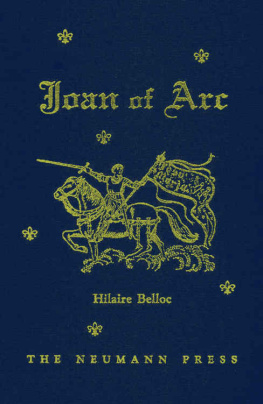Kimberly Cutter - The Maid: A Novel of Joan of Arc
Here you can read online Kimberly Cutter - The Maid: A Novel of Joan of Arc full text of the book (entire story) in english for free. Download pdf and epub, get meaning, cover and reviews about this ebook. year: 2011, publisher: Houghton Mifflin Harcourt, genre: Art. Description of the work, (preface) as well as reviews are available. Best literature library LitArk.com created for fans of good reading and offers a wide selection of genres:
Romance novel
Science fiction
Adventure
Detective
Science
History
Home and family
Prose
Art
Politics
Computer
Non-fiction
Religion
Business
Children
Humor
Choose a favorite category and find really read worthwhile books. Enjoy immersion in the world of imagination, feel the emotions of the characters or learn something new for yourself, make an fascinating discovery.
- Book:The Maid: A Novel of Joan of Arc
- Author:
- Publisher:Houghton Mifflin Harcourt
- Genre:
- Year:2011
- Rating:5 / 5
- Favourites:Add to favourites
- Your mark:
- 100
- 1
- 2
- 3
- 4
- 5
The Maid: A Novel of Joan of Arc: summary, description and annotation
We offer to read an annotation, description, summary or preface (depends on what the author of the book "The Maid: A Novel of Joan of Arc" wrote himself). If you haven't found the necessary information about the book — write in the comments, we will try to find it.
The Maid: A Novel of Joan of Arc — read online for free the complete book (whole text) full work
Below is the text of the book, divided by pages. System saving the place of the last page read, allows you to conveniently read the book "The Maid: A Novel of Joan of Arc" online for free, without having to search again every time where you left off. Put a bookmark, and you can go to the page where you finished reading at any time.
Font size:
Interval:
Bookmark:
Copyright 2011 by Kimberly Cutter
All rights reserved
For information about permission to reproduce
selections from this book, write to Permissions,
Houghton Mifflin Harcourt Publishing Company,
215 Park Avenue South, New York, New York 10003.
www.hmhbooks.com
Library of Congress Cataloging-in-Publication Data
Cutter, Kimberly.
The maid / Kimberly Cutter.
p. cm.
ISBN 978-0-547-42752-2
1. Joan, of Arc, Saint, 14121431Fiction. 2. France
HistoryCharles VII, 14221461Fiction. 3. Christian
women saintsFiction. I. Title.
PS 3603. U 875 M 35 2011
813'.6dc22 2011009146
Book design by Brian Moore
Printed in the United States of America
DOC 10 9 8 7 6 5 4 3 2 1
For Piki, who kept the faith
They promised to lead me to Paradise,
for that was what I asked of them.
J OAN OF A RC
In the dream, death is as far off as the mountains. It's a cold, blue winter morning, and she is riding her horse very fast over a field of snow toward a high pine forest, still dim with shadow. Her armor glints in the early light, the steel giant's hands flashing on either side of her horse's mane, but the metal is strangely weightless in the dream. She does not feel it. What she feels instead is the still and brilliant morning, the snow and the speed and the cold air on her cheeks, and inside of her a violent, holy joy that makes her eyes very bright and propels her wildly over the fields toward the enemy forest, snow spraying and glittering beneath her horse's hooves.
Behind the girl rides her army of ten thousand men, all of them eager as she is, united by the same strange and feverish joy as they crash across the winter fields, across a black icy river that winds, shining like a ribbon, through the white land and toward the shadowed stillness of the pines. She can hear them thundering behind her, and hearing them, she knows that they are riding together toward a mad and glorious victory. And she knows too that they are riding toward death. But there is no fear in her this morning. She is seventeen, a peasant, unschooled, simple as a thumb. Fear has no place in her heart yet, though soon enough it will. Soon enough she will be caged, tortured, branded a witch, a whore, a limb of Satan. But on this morning she is simply God's arrow, shot across the winterland, brilliant and savage and divine. Unstoppable.
She awakes in darkness, curled on the cold stone floor of the tower. The stink of urine and rotted straw burning her nostrils. Iron cuffs biting at the sores on her wrists. Quickly she grabs at the receding dream, hoping to pull it back, to wrap herself up once more in its fierce joy. But no, it's too late. The last tendrils slip through her fingers, and she is left in the dark with her guardsthree of them inside the cell with her, two out in the hall.
They are all asleep now, in this dim, lonesome hour. Propped in the shadows like dolls with their heads fallen forward and their mouths open, snoring. But soon enough, she knows, they'll be awake. Soon enough the big one, the one they call Berwoit, will grin with his square blue teeth and start in with his taunts. "Lift up your skirts for us, witch. Show us what you got under there. Is it a cock or is it a pussy?"
It's clear that she'll die soon. She sees this too in her dreams. The enormous, crackling yellow fire in the square, the grinning Bishop, the appalled, delighted crowds. The priest Massieu says it's not true. "You're safe now," he whispers. Now that she's repented, she's safe.
Soon, he says, they'll transfer her to a church prison, and there will be no more beatings and no more trial, and eventually, the Goddons will forget about her. The war will end, and she'll be set free. "Be patient, child," he says. "Give them time to forget."
She feels sorry for Massieu. Knows he's half in love with her. Even with her shaved head and the rough burlap dress the Bishop makes her wear, even with her ribs jutting out like a starved dog's, he looks at her with shining eyes, sneaks her bits of bread and extra cups of water, brings her wormwood salve for her bruises. She'd like to believe him, but she knows it isn't true. They hate her too much, the English. They will not be happy until they dance on her bones.
Often in the night, when she can't sleep, Massieu comes and sits with her. He waits until the guards are snoring, then drags his low wooden stool over to her cell and sits beside her in the darkness. Holds the bars with his big pink hands, gazes at her. Sometimes he reads from the Bible. Other times he sings, jokes, tries to make her laugh. Occasionally he grows daring, asks questions: "Is it true what they say? Are you a saint?"
She was twelve the first time she heard the voices. It was in the garden in Domrmy, behind her parents' house. A summer day. Hot and green. A great wind rolling in the air, the country a riot of shaking leaves. She was picking beetles off the cucumber plants, collecting them in an old corked jug. Her father said, "You just like it because you can sit there and daydream," but it wasn't true. She liked hunting under the big, rough leaves for the dark little beetles with their black helmets and their scratchy hooked legs. The strange purple and green lights in their armor. Cockroaches disgusted her, but not beetles. Beetles seemed clean and somehow noble, like tiny polished knights.
As she worked, she thought of Catherine, her saint. Catherine whom her mother told aboutthe bravest one of all. She pictured Catherine tall and slim and very fair, with long heavy golden hair and a pale, secretive spoon-shaped face. She loved Catherine, idolized her, but she was jealous of her too. Jealous of her miracles. Jealous that she had died for her love of God. She thought of all the Romans that Catherine had taught to love God. The Emperor's thousands of soldiers kneeling down suddenly, bowing their heads in prayer, their hearts thrown open like shutters on the first warm day of spring. Even the Empress herself kneeling, even the Empress seized by this sudden love of Christ. She thought of how the Emperor Maxentius had hated Catherine for her power, and of all the ways he'd tried to have her killed: the spiked wooden torture wheel that broke apart when the guards tried to tie her to it ... the river from which she kept rising up like a cork, no matter how long they held her under ... the fire that raged around her but left no mark, left her skin cool and white as lilies. At last they had to cut Catherine's head off with an ax to kill her. Jehanne saw the great blade flashing, the pale, shocked face spinning through air, and she wished she could be that brave. That pure.
It was like a fever in her, her love for God. Not mild, not polite. Consuming. Every evening in Domrmy, the bells rang out in the church tower for Compline, and she ran downhill through the wheat fields to be with Him, her feet flying over the grass and dirt, her heart pounding like a hot red drum. He was all she could think about. All she wanted.
"Where does God live?" she'd asked her mother once.
"God lives in Heaven."
"What's Heaven?"
Her mother had looked sad then. Finally she pointed up to the clouds and said, "Heaven is God's beautiful paradise in the sky. If we are very good, we'll go there to live with Him after we die." As her mother spoke, her eyes looked so hungry that Jehanne's heart swelled up like a sail.
"Can't we go there now?"
"No," her mother said. "We can't go there now."
She doesn't know when it first took root inside her, that hunger for God. Perhaps it was always there. She remembers knowing that He was the one who made the trees. And the wind in the trees. And the clear, icy green river with the round white stones on the bottom. And the red harvest moon. And the little black starlings that dipped and soared over her head at sunset, thousands of them rising and tilting and soaring, flashing their black wings against the flushed pink sky.
Next pageFont size:
Interval:
Bookmark:
Similar books «The Maid: A Novel of Joan of Arc»
Look at similar books to The Maid: A Novel of Joan of Arc. We have selected literature similar in name and meaning in the hope of providing readers with more options to find new, interesting, not yet read works.
Discussion, reviews of the book The Maid: A Novel of Joan of Arc and just readers' own opinions. Leave your comments, write what you think about the work, its meaning or the main characters. Specify what exactly you liked and what you didn't like, and why you think so.













